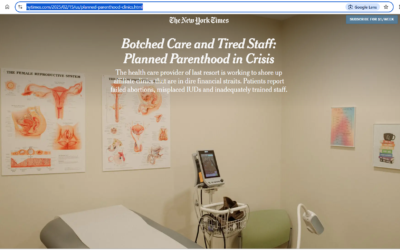Issue
Standards for Explicit Sexual Content in Schools
KEY POINTS
- School Boards are legally permitted to create policy setting standards for preventing age-inappropriate sexually explicit content in their curriculum and library.
- The standard ought not be: “As long as this book doesn’t land us in jail for giving it to a minor, the sexually explicit content is welcome in our curriculum or the school library.”
- Written policy protects students, parents, employees, and the school
and ensures better educational content will fill the finite space in curriculum and in libraries. - Schools should prioritize material that provides rich educational value over material that may provide similar value but also has age-inappropriate sexually explicit content.
- Age-Appropriate policies are not directed at viewpoint and are not banning the book from student possession. They are exercising the schools prerogative to determine what to include in its own library and curriculum.
Standards for Sexually Explicit Content in Schools
Schools must engage in line-drawing for age appropriateness of sexually explicit content in their library and curriculum. Criminal laws are one required line prohibiting schools from giving materials to minors in curriculum or library that a court deems pornographic or obscene. But what about sexually explicit content that does not rise to the extremely high bar of criminal law?
School boards are legally permitted to articulate standards that go beyond “would we land in jail for giving this book to a minor?” to prevent other age-inappropriate sexually explicit content in their curriculum and school library. Unfortunately, many schools have no policy standards for sexually explicit material beyond criminal law.
Schools with written age-appropriate standards for sexually explicit materials that differ for elementary, middle, and high schools protect students and ensures better educational content will fill the finite space in curriculum and in libraries.
But such written policies also protect the school’s staff and district from costly litigation. Even without written policy, a school librarian, principal, or school board is permitted to remove a particular title they deem age-inappropriate sexually explicit material. But with written policy standards, the school is less susceptible to baseless allegations that the title was removed for an impermissible viewpoint discriminatory reason.
School employees still have wide discretion to select and purchase books that comport with the age-appropriate standards in written policy set by the school board, and from that universe of materials, parents then have ultimate authority to make additional age-appropriate determinations for their own child and should have authority to restrict certain titles for their own child.
Individuals who desire to see sexually explicit materials in the hands of minors sometimes argue that such policies are “book bans.” Attempts at labeling common-sense school standards as “book bans” have been rejected by courts. See, C.K.-W. v. Wentzville R-IV Sch. Dist., 619 F.Supp. 3d 906, 909-910 (E.D. Mo. 2022) (“A school district does not ‘ban’ a book when, ‘through its authorized school board,’ it ‘decides not to continue possessing [a] book on its own library shelves.’”) Citing ACLU of Fla., Inc. v. Miami-Dade Cnty. Sch. Bd., 557 F.3d 1177, 1218 (11th Cir. 2009).
A parent, for example, who wants to buy sexually explicit books for their own child to read are not prevented from doing so by such school policies. School policies setting forth its own age-appropriate standards for sexually explicit content in its own curriculum and school library do not even prohibit a student from bringing their own book to school or from reading it in an appropriate time, such as study hall. But school districts do not have to put such explicit books in their own curriculum or in the school library, and such a decision by the school is not a ban on books.
Such policies treat inappropriate sexually explicit content the same regardless of whether the sexually explicit depictions or descriptions happen to be between straight, gay, or even a lone person. As such the argument made by those who desire to see sexually explicit materials in the hands of minors, that these policies are directed at LGBT people, is false.
Too many schools lack baseline standards regarding sexually explicit content in school libraries. Schools ought to spend the finite time in the day on academic excellence, and sexually explicit content detracts from that. Explicit sexual depictions and descriptions may sell, but refusal to purchase it is no ban. Districts can decide not to buy and stock sexually explicit content. If you are a school board member who desires to implement such a policy, we are glad to assist you.

Related Articles
Embracing Authentic Masculinity: A Call for Meekness in a Crisis of Manhood
At the Pennsylvania Family Institute, we are committed to fostering strong families and communities rooted in timeless values. This is why we’re excited to share insights from an article by Andrew Warthen, a former intern, graduate of Franciscan University of...
“Love is Love”?
You've seen and heard it everywhere—from bumper stickers, lawn signs and billboards to the mouths of celebrities and politicians: "Love is love." It sounds nice. Caring. Non-confrontational. But when you really stop and think about it, this phrase does a lot more than...
There’s Nothing “Family-Friendly” About the Fairness Act or Drag Shows in the Capitol.
A troubling event was scheduled to take place at the Pennsylvania State Capitol on Tuesday, June 3rd: a so-called “family-friendly drag show” hosted in support of the reintroduction of the Fairness Act. Although the event has now been postponed, the underlying agenda...
I Was Scared To Become A Mom
Those who know me may be surprised to read that. Of course, I was beyond excited when I found out I was pregnant last January, and that excitement was genuine. But being pregnant was one thing—having a baby was another! See, I was one of the youngest in both...
Parents Silenced: What Happened When Opt-Out Rights Were Denied
Last fall, at a dinner in Baltimore hosted by the Maryland Family Institute, I met a father whose deep concern for his young son is shared by parents like you and me all across Pennsylvania. In Washington, that father, Jeff Roman, and his wife, Svetlana, had their...
President Trump Signs Executive Order to Dismantle Department of Education, Empower Parents and Local Communities
In a welcomed move to return educational authority to the states, President Donald Trump signed an executive order Thursday directing the phased closure of the U.S. Department of Education. The order shifts power away from Washington and back to states, school...
Planned Parenthood’s Real Business: Killing Babies, Hurting Women, and Indoctrinating Kids
The New York Times recently published an exposé revealing the dire conditions inside Planned Parenthood locations nationwide. From botched abortion procedures to severe staff shortages and deteriorating facilities, the report painted a disturbing picture of an...
The Real Dangers of High-Potency Marijuana
"I hear stories all the time of the impacts of marijuana on people and really catastrophic impacts on them." - Robert F. Kennedy, Jr. A three-minute video from Truth On Weed highlights news stories covering families speaking out about the tragedy they have endured as...









